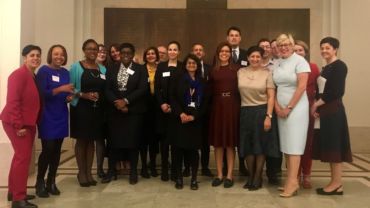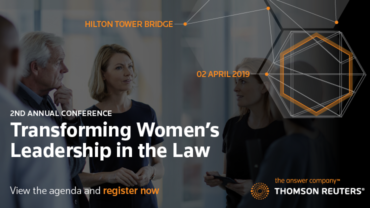REUTERS/Steve Crisp
Senior women from law firms in Dubai gathered recently at the second roundtable, in the region, of 2019 as part of the Thomson Reuters Transforming Women’s Leadership in the Law (TWLL) programme to discuss the key ingredients needed for women lawyers to be successful.
Maha Abboud, the territory manager for the Middle East-North Africa business at Thomson Reuters, also took the opportunity to sit down with one of the attendees, Rania Tadros, Managing Partner in the Dubai office for Ince & Co, to discuss her experience as a female leader in law.
Tadros says that as a leader it is her responsibility to make the practice of law easier for both men and women. Tadros recognises that there are women who have had a much harder time at work in advancing in their career and admits that she probably did have situations where she was disadvantaged herself as a woman lawyer even if she didn’t realise it at the time. More specifically, Tadros thinks it is important for her to make it easier for men to share the role of childcare with their partners, allowing those women to dedicate more to their careers.
Indeed, Tadros notes that the support she received from her spouse played a critical role in her success and explains how she and her spouse both take active roles in their family commitments. Because both Tadros and her spouse value their careers, it always is an evolving conversation, changing day by day, Tadros says, adding that she determines in the moment what is important to her right now, knowing that sometimes her family will have to wait and sometimes it is her clients that will have to wait. “My spouse doesn’t see it as a compromise”, Tadros explains. “He sees it as being equally his role to be with the children as I am.”
Watch the interview with Rania Tadros here.
Hot Topics from the TWLL Dubai Roundtable
Similarly, attendees of the roundtable event discussed important components needed for women to achieve success in their legal careers, including:
The role of diversity and inclusion policies and internal targets for women’s representation at senior levels: Women attendees generally were split into two camps on the value of using internal targets to force gender diversity. While one group necessitated the importance of having guidelines written down and top management questioned about it, others argued that these guidelines were secondary and what really matters is people’s mentality in the workplace.
The double-bind for women in advocating assertively and confidently: It is no secret that women have a narrower spectrum of acceptable behaviour relative to men. This was a source of robust debate among the roundtable attendees. Some participants indicated that women need to be more assertive, confident, and open about what they want. Moreover, women need to raise their voices and speak up, several attendees said, noting cases in which attendees’ confidence and assertiveness unquestionably helped them reach the positions they now hold.
At the same time, assertiveness and openness can be a double-edged sword, other attendees cautioned, offering examples where women’s display of confidence and openness triggered serious problems for them and led to them eventually leaving the firm.
During the roundtable, part of the discussion was around the research conducted by the UK chapter of TWLL and Acritas. The aim of the research was to find objective evidence of which levers were effective to help increase diversity at senior levels.
To download a copy of the report: ‘Transforming Women’s Leadership in the Law—Current approaches to improving gender diversity at senior levels in law firms and correlated success’, click here.
By the end of the event, there was consensus on some issues and it showed up in two ways:
- the critical role that company culture plays in dictating whether women feel ‘safe’ to speak out or not; and
- the large role that women’s upbringing and family expectations play in influencing appropriate behaviours of women.
As with TWLL events in other regions, the tremendously positive reception of the Dubai roundtable echo’s similar themes. There is an appetite for a platform with an open and relaxed environment to share experiences of professional journeys and to share practicable solutions for navigating to success. Moreover, there is a genuine desire to reenvision cultural organisational behaviours to help pave the way for meaningful change in the legal profession.



